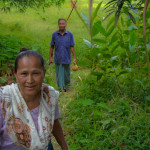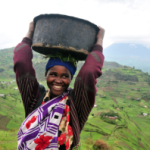New publication from Catherine Bertini in Dædalus, the Journal of the American Academy of Arts & Sciences Abstract: Women are ubiquitous and critical to the nutritional well-being of their families, yet they are often invisible to policy-makers, public officials, community leaders, and researchers. Effecting significant decreases in the number of hungry poor people, as well as the >> Read more
Takeaways from twenty years of gender and rural development research at IFPRI: Household decision making and women’s control over resources
The following blog by IFPRI gender experts Sophie Theis, Agnes Quisumbing, and Ruth Meinzen-Dick is the first in a four-part series leading up to the Policy Seminar on "Beijing +20 and Beyond: How Gender Research Is Changing the Landscape of Food Policy," to be held on October 14, 2015 at IFPRI's Washington, DC headquarters. The >> Read more
Publication: “Focus on Families and Culture: A guide for conducting a participatory assessment on maternal and child nutrition”
For many years Maternal and Child Health and Nutrition (MCHN) programs have focused on women of reproductive age (WRA) given that they and their young offspring are the primary risk groups. This choice has also been influenced by the idea that WRA act independently regarding MCHN practices. In the past few years, programs have increasingly involved men based >> Read more
Gender and Development: Special Issue on Inequalities
The Gender & Development Special Issue on Inequalities has been published. The articles in this issue of G&D, co-edited with Naila Kabeer, come from a wide range of voices in international development research, policy and practice, and offer a gendered perspective on inequalities. To subscribe to all content from the journal, you can also click here.
Report Release: Measuring Women’s Economic Empowerment and M&E Guidelines
From the Women's Economic Empowerment: A Roadmap website: Design challenges are common to most program evaluations, but this is especially true for programs that measure women's economic empowerment. This is because of the interdependence between women's economic and social roles, which influences their business choices and returns to those businesses. For example, because women have >> Read more
Does Uganda sufficiently address gender inequalities in climate policies? (via CCAFS)
The CGIAR Research Program on Climate Change, Agriculture and Food Security (CCAFS) together with partners International Center for Tropical Agriculture (CIAT) and International Institute for Tropical Agriculture (IITA), recently released an Info Note analyzing Uganda's climate and development policies from a gender perspective. Feel free to explore the following resources: Download Info Note: Gender and >> Read more
New FAO publication: Running out of time: The Reduction of women’s work burden in agricultural production
Abstract: Based on a broad literature review, this publication discusses rural women’s time poverty in agriculture, elaborates on its possible causes and implications and provides insight into the various types of constraints that affect the adoption of solutions for reducing work burden. This paper raises questions about the adequacy of women’s access to technologies, services >> Read more
New publication: Rural Women and Empowerment Topic Guide
The Rural Women and Empowerment Topic Guide is now published and available at: http://www.evidenceondemand.info/topic-guide-womens-empowerment-in-a-changing-agricultural-and-rural-context It was prepared through the Evidence on Demand information hub (http://www.evidenceondemand.info/homepage.aspx) for DFID livelihood officers, but can be a resource for a wider audience working in rural areas. There are 5 sections and links to further gender related resources 1. >> Read more
New post on EnGendering Data Blog: Debunking the myth of female labor in African agriculture
EnGendering Data, a blog on improving data on the role of gender in agriculture, has a new post on female labor in African agriculture. Cheryl Doss shares new studies that "offer our most detailed understanding to date of rural economies in Africa" and challenge the widely cited "fact" that women in Africa provide 60-80% of the labor in agriculture. >> Read more
Special issue of Agricultural Economics on gender and agriculture in sub-Saharan Africa
The May 2015 issue of Agricultural Economics features articles on gender differences in sub-Saharan African agriculture. Papers are available here. This special issue contributes to the literature on gender differences in sub-Saharan African agriculture primarily by using new and innovative micro-data. The first six articles have a strong focus on understanding the extent and drivers of >> Read more
- « Previous Page
- 1
- …
- 5
- 6
- 7
- 8
- 9
- …
- 21
- Next Page »




